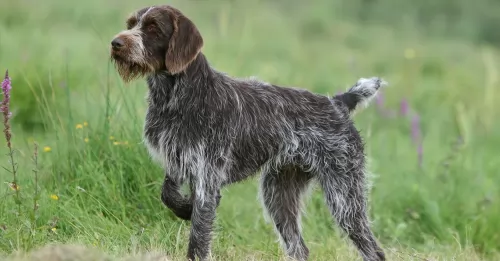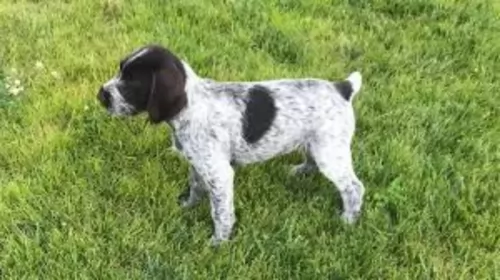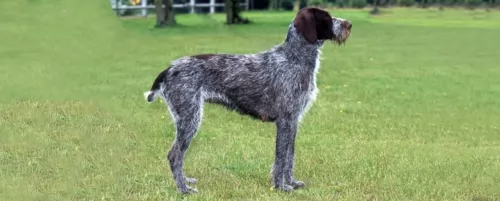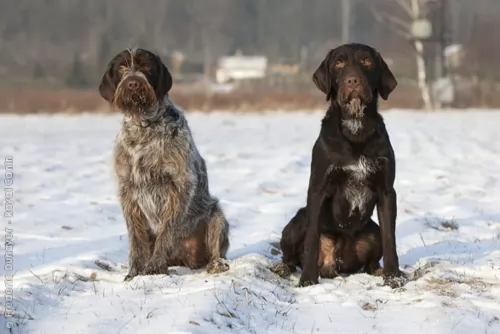 Petzlover
Petzlover Cesky Fousek is originated from Czech Republic but Puli is originated from Hungary. Cesky Fousek may grow 21 cm / 9 inches higher than Puli. Cesky Fousek may weigh 15 kg / 34 pounds more than Puli. Both Cesky Fousek and Puli has same life span. Both Cesky Fousek and Puli has almost same litter size. Cesky Fousek requires Low Maintenance. But Puli requires High Maintenance
Cesky Fousek is originated from Czech Republic but Puli is originated from Hungary. Cesky Fousek may grow 21 cm / 9 inches higher than Puli. Cesky Fousek may weigh 15 kg / 34 pounds more than Puli. Both Cesky Fousek and Puli has same life span. Both Cesky Fousek and Puli has almost same litter size. Cesky Fousek requires Low Maintenance. But Puli requires High Maintenance
 The Cesky Fousek is also known as the Bohemian Wire-Haired Pointing Griffon and he hails from the Czech Republic. The name ‘Fousek’ is referring to the dogs facial hair.
The Cesky Fousek is also known as the Bohemian Wire-Haired Pointing Griffon and he hails from the Czech Republic. The name ‘Fousek’ is referring to the dogs facial hair.
With World War 1, the dog all but disappeared, but with careful breeding, its numbers have built up. Today the dog is a popular hunting breed in its home country. In 1957 and 1958, Czechoslovakia joined the Federation Cynologique Internationale, and this is when a new breed standard was written and approved. In 1964, the dog breed was recognized by the FCI and by the United Kennel Club in 1996.
The Cesky Fousek has even been represented on postage stamps issued in the country in 1965, and again in 1973. Today, the breed is as popular as ever in the Czech Republic as well as other countries where there are breeding programs.
 The Puli’s history is ancient, going back about 2,000 years. It is believed that Sumerians used Puli-type dogs to herd sheep thousands of years ago.
The Puli’s history is ancient, going back about 2,000 years. It is believed that Sumerians used Puli-type dogs to herd sheep thousands of years ago.
Ancient excavations show signs of Puli dogs. It is believed that Magyar tribesmen brought Pulis to Hungary for their herding abilities. The Puli was registered by the American Kennel Club in 1936, and the Puli Club of America was formed in 1951.
 The Cesky Fousek is a medium sized dog with both the male and the female standing between 58 – 66cm and weighing 22–28kg. The dog has a fairly distinctive appearance, looking quite a bit like a German Wire-haired Pointer, but he has the mustache and beard which the Pointer doesn’t have.
The Cesky Fousek is a medium sized dog with both the male and the female standing between 58 – 66cm and weighing 22–28kg. The dog has a fairly distinctive appearance, looking quite a bit like a German Wire-haired Pointer, but he has the mustache and beard which the Pointer doesn’t have.
The tail of this dog is carried horizontally and is generally docked to 3/5 of its natural length to give the dog a distinctive look. These days, with regulations around docking, the tail is left long. The ears are floppy and rounded at the tips and the eyes are brown.
The dog’s coat is short to medium length and fairly coarse with colors being dark roan or brown with ticked markings.
The Cesky Fousek is an energetic, eager-to-please dog and he just loves playing with the children in the home. He is an intelligent dog who is loyal, social and protective and you’ll find that he is easy to train. In fact, with socialization and training, he becomes obedient and amicable around adults, children and other pets.
 The Puli is a medium sized dog from Hungary standing at between 36 an 45cm in height and weighing 10 to 13kg. He has always been a herding dog and his long,corded coat has been his trademark.
The Puli is a medium sized dog from Hungary standing at between 36 an 45cm in height and weighing 10 to 13kg. He has always been a herding dog and his long,corded coat has been his trademark.
The color of the coat can be black, white or cream but black is the color most seen with the Puli. The dog may well be a low shedder, but the coat is still going to need a lot of maintenance to keep it looking reasonable. It gets longer and longer and will need to be groomed to keep the cords neat and clean.
The Puli is an intelligent dog and it can be trained to respond to some simple commands. If the dog gets enough exercise, he can adapt to life in the country or in the city. As a herding dog he is used to being busy and will need walks, a run off his leash in the park and ball games.
They get on well with children and with other pets and are loyal to their owners and wary of strangers. They are highly active dogs these, and they just love playing games throughout their adult lives.
Because they are dogs which need a lot of exercise and space, they are more suited to life in the countryside as opposed to life on a small property in the city. They also make good faithful family guardians.
 The Cesky Fousek is a fun loving, good natured dog who is always up for a game. This is why he isn’t a dog that will fit into an apartment or shoe-box size garden.
The Cesky Fousek is a fun loving, good natured dog who is always up for a game. This is why he isn’t a dog that will fit into an apartment or shoe-box size garden.
Socialize and train him and he becomes a wonderful family pet, good around children and other pets. He loves human companionship and isn’t a dog to be left outside to run around on his own.
The Cesky Fousek is easy to train, and when he is treated properly and made to feel an important member of the family, he provides you with his unconditional love and friendship.
 Your Puli is a self-confident, strong willed dog that is intelligent and can learn to be obedient and well mannered. They are also social and playful, and will love to be a family pet, being prepared to provide friendship and loyalty.
Your Puli is a self-confident, strong willed dog that is intelligent and can learn to be obedient and well mannered. They are also social and playful, and will love to be a family pet, being prepared to provide friendship and loyalty.
Because he has always been a herding dog, he takes his role of guardian and protector of his human family seriously. He makes a splendid pet if you’re ready to tackle the long coat which makes sure he doesn’t fit into the low-maintenance category.
 The average lifespan of this dog breed is about 12 to 15 years, and even though he is a robust breed, some common health issues do exist.
The average lifespan of this dog breed is about 12 to 15 years, and even though he is a robust breed, some common health issues do exist.
Certainly if you’re considering breeding for your Cesky Fousek, you’ll want to have him tested for dysplasia, eye problems and Von Willebrands Disease.
Von Willebrands Disease is an inherited bleeding disorder, caused by a deficiency in the amount of a specific protein needed to help platelets.Often the dog doesn’t show outward evidence of having the disease while other dogs might even hemorrhage from the nose or elsewhere.
 Joints, eyes, and skin problems can cause problems with the Puli dog. Hip dysplasia is a problem with many dogs that can cause pain and also lameness.
Joints, eyes, and skin problems can cause problems with the Puli dog. Hip dysplasia is a problem with many dogs that can cause pain and also lameness.
Check your pet over with grooming sessions and make sure both the ears and eyes are free of discharge and redness.
The coat is thick and the Puli will require you to watch his skin for bacterial infections which can be caused by a lot of itching and scratching. Other common canine health issues to look out for are cancer and bloat.
 The coat of the Cesky Fousek is easy to maintain and you’ll want to brush him at least twice a week with a firm bristle brush to get through the coarse hair and rid him of loose hairs.
The coat of the Cesky Fousek is easy to maintain and you’ll want to brush him at least twice a week with a firm bristle brush to get through the coarse hair and rid him of loose hairs.
Ear infections are common in dogs, but dogs with floppy ears are more susceptible to ear infections than dogs with erect ears. The infection often starts in the external ear canal and occurs when excess bacteria grows in the ear canal and it becomes inflamed.
Always take your pet to the veterinarian at the first sign of an ear infection. You’ll notice your pet shaking his head and the ear may well be red and inflamed. Your vet will discuss the proper treatment and suggest ways to prevent recurrence. The vet may also recommend an ear cleaning solution as well.
This dog breed needs plenty of exercise and he’ll love his daily walks with you. Put him on a leash and allow him to run with you when you go cycling or jogging.
This is a very active dog used to hunting and he’ll require good quality protein. Speak to your vet about how many calories your dog will need each day, more so if you have a puppy and are unsure in terms of his growth.
He is a medium-to-large breed so you’ll want a food that caters for his size, his age and his energy. Include portions of rice, vegetable and meat into his kibble from time to time for variety, and never forget to include some raw meat into his diet.
Fresh, cool water is of critical importance and should be available night and day.
 Training and socialization is important for any dog and not just the Puli. Well trained dogs are a joy to have around – they are obedient and well mannered. The Puli is intelligent enough for you to train him yourself or you can have a professional trainer do it for you.
Training and socialization is important for any dog and not just the Puli. Well trained dogs are a joy to have around – they are obedient and well mannered. The Puli is intelligent enough for you to train him yourself or you can have a professional trainer do it for you.
The Puli is an athletic dog but you don’t want to start with any strenuous exercise with a young dog less than a year of age. Take your young dog for walks and give him some ball games. Only start more strenuous exercise later on to spare unnecessary pressure on the joints which could lead to hip dysplasia later on.
Every dog needs to be brushed and groomed to ensure its health. A dog like the Puli will need additional grooming because of the long dreadlocks for a coat. Many Puli owners prefer to have the hair cut short.
The coat of the Puli luckily doesn’t shed much but the coat, if you keep it long, will require a special wide tooth comb. You’ll need to check inside his ears, check that his eyes are bright without any discharge and also trim his nails.
You will have to check inside his mouth too. He can’t tell you if he has a rotten tooth that is painful and causing him to be sick. You need to regularly check his teeth.
It is important to know how much to feed your Puli. A healthy diet is so important for good health and a long life. All dogs have different appetites depending on their age, their breed, their size, the season of life they’re in and their activity levels.
It is better to feed your dog twice a day as opposed to one meal a day to avoid life threatening illnesses such as bloat. There are excellent commercially manufactured dog foods, but also bad ones, so you want to make sure that the kibble you choose is a high quality one with lots of vitamins and minerals.
You want to give him some home-made food too, keeping it simple and uncomplicated – the way dogs like it. Boiled chicken, brown rice or pasta and spinach, sweet potatoes and carrots are a healthy choice for your pet.
Chop it up and add it into the dry kibble a couple of times a week. Some raw meat added in from time to time will contribute to him being healthy. Never leave him without a constant source of fresh, cool water.